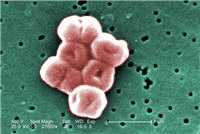Acinetobacter in Healthcare Settings
General information about Acinetobacter
Acinetobacter [asz−in−ée−toe–back−ter] is a group of bacteria commonly found in soil and water. While there are many types or “species” of Acinetobacter and all can cause human disease, Acinetobacter baumannii [asz−in−ée−toe–back−ter boe-maa-nee-ie] accounts for about 80% of reported infections.
Outbreaks of Acinetobacter infections typically occur in intensive care units and healthcare settings housing very ill patients. Acinetobacter infections rarely occur outside of healthcare settings.
Symptoms of Acinetobacter infection
Acinetobacter causes a variety of diseases, ranging from pneumonia to serious blood or wound infections, and the symptoms vary depending on the disease. Acinetobacter may also “colonize” or live in a patient without causing infection or symptoms, especially in tracheostomy sites or open wounds.

For more images of this bacterium, search the Public Health Image Library
Transmission of Acinetobacter infection
Acinetobacter poses very little risk to healthy people. However, people who have weakened immune systems, chronic lung disease, or diabetes may be more susceptible to infections with Acinetobacter. Hospitalized patients, especially very ill patients on a ventilator, those with a prolonged hospital stay, those who have open wounds, or any person with invasive devices like urinary catheters are also at greater risk for Acinetobacter infection. Acinetobacter can be spread to susceptible persons by person-to-person contact or contact with contaminated surfaces.
Prevention of Acinetobacter infection
Acinetobacter can live on the skin and may survive in the environment for several days. Careful attention to infection control procedures, such as hand hygiene and environmental cleaning, can reduce the risk of transmission.
Treatment of Acinetobacter infection
Acinetobacter is often resistant to many commonly prescribed antibiotics. Decisions on treatment of infections with Acinetobacter should be made on a case-by-case basis by a healthcare provider. Acinetobacter infection typically occurs in ill patients and can either cause or contribute to death in these patients.
- Page last reviewed: November 24, 2010
- Page last updated: November 24, 2010
- Content source:


 ShareCompartir
ShareCompartir